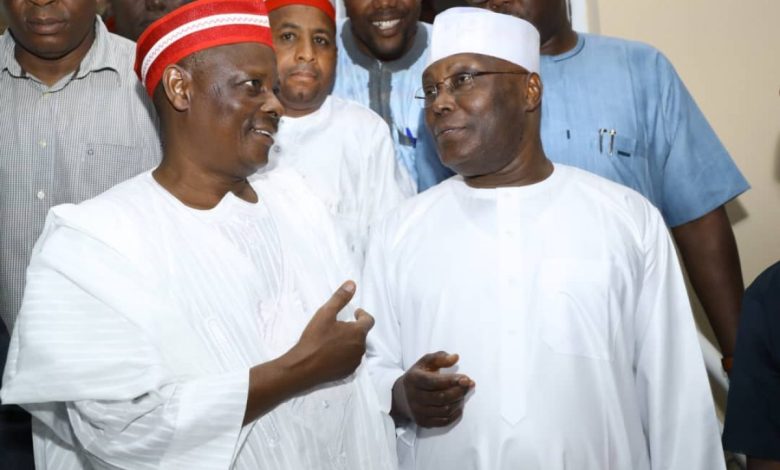
Following the death of former President Muhammadu Buhari, conversations about the future of northern Nigeria’s political leadership have intensified, with attention turning to former Vice President Atiku Abubakar and former Kano Governor Rabiu Musa Kwankwaso.
Buhari died in London on July 13 after a prolonged but undisclosed illness. His body was flown to Nigeria two days later and buried in his hometown, Daura, in Katsina state, following Islamic rites.
President Bola Tinubu, Vice President Kashim Shettima, traditional rulers, top politicians, family members, and thousands of ordinary Nigerians attended the burial.
Tributes poured in from across the country, with speakers hailing Buhari’s discipline, simplicity, and perceived incorruptibility.
But beyond the glowing eulogies lies a growing concern over the political vacuum left by his passing, particularly in the North, where he commanded a cult-like following.
In Kano and other major northern cities, debates have emerged over who might inherit Buhari’s mantle.
Anthony Sani, former secretary-general of the Arewa Consultative Forum (ACF), said Buhari’s appeal rested on rare personal attributes.
“Our leaders in the North must now learn that honesty, integrity, simplicity, and a genuine vision for the people are what matter — as Buhari demonstrated.
“He may be gone, but his legacies remain. No one can easily fill the void he left behind,” Sani told Daily Sun.
For Kano-based political analyst Usman Kabo, Buhari’s rise was less about personal ambition and more about regional need.
“He did not set out to seek power. It was the North that found him and dragged him into politics,” he said.
Kabo argued that Buhari’s credibility was rooted in his military background, anti-corruption stance, and personal austerity, all of which resonated deeply with the northern masses.
He stated: “In the eyes of many, Buhari represented sincerity, God-fearing leadership, and justice. That perception helped cement his place in the hearts of the poor.”
But with Buhari’s political machinery now leaderless, attention is shifting to potential successors, with Atiku Abubakar and Rabiu Kwankwaso seen as the two most likely to step into the role.
Jafar Sani Bello, a 2025 governorship aspirant in Kano under the Peoples Democratic Party (PDP), argued that Buhari’s fabled “12 million votes” had already dissipated before his death.
His words: “If that number still held, Tinubu would have received more than eight million votes in 2023.
“In reality, Atiku took a chunk, Kwankwaso got the crumbs, and Tinubu the rest.”
Bello said Atiku, a veteran of multiple presidential contests and a former vice-president, remains the most viable northern figure with the structure, funding, and reach to fill the vacuum.
“Any honest comparison would show that Kwankwaso cannot match Atiku in terms of national reach,” he said.
Alwalu Ibrahim, secretary of the PDP in Kano, shared a similar view.
“Atiku is an old horse. He has networks in every part of the North. Kwankwaso’s influence is largely confined to Kano,” he said.
He cited the 2023 presidential election, where Kwankwaso won 58.4 percent of the vote in Kano but performed poorly in other northern states, scoring just 8.4 percent in Bauchi, 6.8 percent in Kaduna, and less than one percent in Kebbi and Zamfara.
“Those are not the numbers of someone who commands the North,” he said.
Still, others argue that Kwankwaso may be better placed to inherit Buhari’s symbolic appeal.
He is seen by many as a populist figure with a mass movement, Kwankwassiyya, known for its grassroots mobilisation and loyal base. He has also positioned himself as a fierce defender of northern interests.
At a recent constitutional amendment forum in Kano, Kwankwaso accused the Tinubu administration of favouring the South in resource allocation.
His words: “Most of the national budget is tilting in one direction. From Abuja to Kano by road is hell. Yet we’re told that billions are going to other regions.”
His remarks were praised by several northern groups who viewed them as courageous.
But critics say Kwankwaso is too polarising, lacks the trust of many elite political players in the region, and has limited influence beyond Kano.
Meanwhile, Atiku faces his own set of criticisms. His opponents argue that he is perceived as elitist, overly ambitious, and disconnected from the grassroots, especially the rural poor who formed the backbone of Buhari’s support.
His recent defection to the African Democratic Congress (ADC) and the fragmentation of his former political base have also raised questions about his long-term viability.
Still, many believe Atiku has a better national platform and more institutional knowledge to consolidate the North politically.
Whether it is Atiku or Kwankwaso, what is clear is that Buhari’s death has created an ideological and symbolic vacancy in northern politics.
Whoever fills it will not only need the numbers but must also inspire the kind of trust, loyalty, and mystique that defined Buhari’s grip on the northern psyche for decades.
